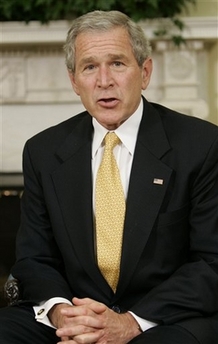Elections may shift US Iraq war policy
(AP)Updated: 2006-11-10 16:45
WASHINGTON - Democratic control of Congress, public dislike for the Iraq war and the departure of Defense Secretary Donald H. Rumsfeld could open the door for a policy shift in the conflict, but early maneuvering for the 2008 presidential election could slam the door shut.
Although both parties want to salvage political and military success in Iraq for its own sake, the war's prominence as a political issue complicates bipartisan cooperation.
That may be especially true for Democrats if they conclude that anything shy of a demand for fast withdrawal of US troops looks wishy-washy, or that the modest course changes possible by cooperating with Republicans would be jumping onto a sinking ship.
Cooperation is possible if both parties see it in their interest to lower the political temperature on Iraq, making it less of a rallying cry for the next campaign, said James Carafano, senior fellow at the conservative Heritage Foundation. He argued that both parties and the country would benefit.
"There is a remarkable opportunity to change the politics, for Democrats and the president to take the Iraq issue off the table as an issue to play political pingpong with," said Carafano, who studies politics and military issues.
More than half of voters said they disapproved of the war in Iraq, wanted troops to start coming home and didn't think the war has improved security in the United States, according to exit polls conducted Tuesday for The Associated Press and the television networks. Those most unhappy with the war helped put Democrats in control of Congress.
Democrats say the first step to repairing the situation in Iraq is putting substantial pressure on its government to take more responsibility. The best way to do this, they say, is by pulling out some troops right away to signal the U.S. commitment is finite.
Democrats also have called on Bush to convene an international conference on Iraq and say the military mission should begin to switch from a leading role to a supportive one.
Other proposals the administration may be asked to consider include a
regional dialogue with US adversaries Iran and Syria, or remaking the Iraq
political federation into three largely autonomous sectarian states.
| 1 | 2 |  |
|
||
|
||
|
|

